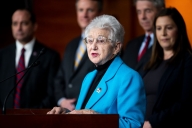You have /5 articles left.
Sign up for a free account or log in.
The U.S. Department of Education on Wednesday unveiled a proposed overhaul of a federal rule on student loan forgiveness, with a plan to possibly make the process more restrictive for defrauded borrowers.
The department crafted the new borrower-defense rule after blocking an Obama administration regulation from going into effect last year. Like the Obama rule, the department’s new proposal would establish a clear federal standard for borrowers who are pursuing loan discharge. But it includes numerous changes that would reduce potential relief for borrowers as well as liability for colleges.
The proposal also contemplates allowing loan forgiveness applications only for borrowers in default, which would dramatically reduce the number of students who are eligible for relief.
“Our commitment and our focus has been and remains on protecting students from fraud,” Betsy DeVos, the education secretary, said in a written statement. “The regulations proposed today accomplish that by laying out clear rules of the road for higher education institutions to follow and holding institutions, rather than hardworking taxpayers, accountable for making whole those students who were harmed by an institution’s deceptive practices.”
The proposed regulation would consider students to be eligible for relief if they demonstrate that their institution knowingly made false statements in advertising or recruitment materials or made promises about a program with a reckless disregard for the truth -- a standard student advocate groups say would place a bigger burden of proof on borrowers themselves.
The rule also would require that borrowers’ claims be addressed individually, rather than in a class action, as allowed under the existing rule. The department rarely, but in some cases, has granted automatic loan relief to all students who attended certain institutions.
Senator Patty Murray, the Washington Democrat who is the ranking member on the Senate education committee, said the new proposal was evidence DeVos had prioritized corporations over students.
“This rule would cut billions in debt relief to students who were simply trying to better themselves and instead were cheated out of their education and savings,” she said in a written statement. “This is a clear sign that students cannot rely on Secretary DeVos, and that she will continue to give predatory for-profit colleges and corporations a free pass when they mislead, cheat and defraud students.”
The proposal would not codify into regulation a formula for determining the appropriate amount of loan relief for students but would give the secretary the authority to determine the level of harm in each case. Under the Obama administration, students with approved claims received full loan discharge. But DeVos in December announced a partial relief formula for approved borrower-defense claims based on the typical earnings of a student who attended a specific program.
The regulatory package also addresses loan discharge scenarios in the case of school closures. It would extend to 180 days the window under which students could be eligible for relief if they withdrew from a school before its official closure date. Currently, borrowers who withdraw within 120 days of a school’s closure are eligible for a loan discharge.
But the rule would end automatic loan discharge for students who have not re-enrolled elsewhere within three years of a school closure. Those borrowers would instead have to proactively seek relief themselves.
And where closed colleges plan an orderly teach-out plan approved by their accreditor and state regulators, students would not be eligible for loan discharge.
The rule also includes several mandatory and discretionary triggers that would require financial protections from colleges, like a letter of credit. Mandatory events would include successful borrower-defense claims or a judgment against the institution in a lawsuit. Discretionary triggers could include an accreditor putting a college on a "show-cause" sanction -- essentially requiring the college to demonstrate why it should maintain the accreditor's approval.
The department is facing a tight November deadline to finalize the rule. The next step is opening the proposal to public comment over the next 30 days. In those comments, the department is asking members of the public to directly address whether it should consider only claims from borrowers in default or claims from student borrowers who believe they were misled but who are still repaying their loans.








